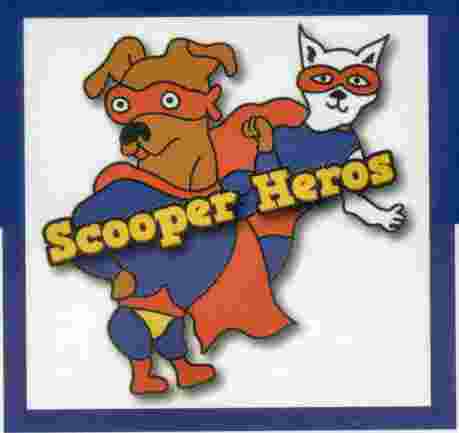
The dog shown above as well as on her Scooper Heros brochures and business cards looks a lot like the animated harmless cartoon character, Scooby Doo. Indeed, Scooper Heros can “rescues you from the poo,” according to Kelley Steger, the sole owner of the business. We’re talking about dog poo of course. However, it is about so much more than just hiring someone else to perform the dreaded chore of scooping poo out of your yard. It’s also a concern about the health and welfare of both pets and humans.
The proper equipment for her scooping tasks are shoe covers for her feet, a rake, waste disposal tray and bags to remove the waste.
Why should Steger and not the owners pick up their dog’s feces? According to Steger, her potential clients are dog owners that are elderly, busy mothers, pregnant women, or just busy people looking to unload a few chores. These ordinary people with busy lives probably don’t realize how important it is to remove fecal material.
Steger worked to become well prepared for her business. She is licensed from the proper credentialing agencies and is insured. She attended the Turner Center for Entrepreneurs and worked with SCORE (Service Corps of Retired Executives).
Steger has gathered research from the United States Environmental Protection Agency and the Center for Disease Control websites. She discovered that specific consequences occur when the dog feces are not scooped after a dog defecates. “Within a week, eggs that come from the feces breakdown, causing unhealthy bacteria and usually develop after a month of growing. Once the decaying feces are absorbed by the soil, it becomes a harmful bacterial agent.”
According to Steger’s research, “failing to pick up after a pet is a health concern for humans and other animals, and can lead to water quality problems. Pet waste contributes nutrients, parasites and bacteria to water ground tables and other water bodies when it is not disposed of properly.”
Since storm drains do not always connect to treatment facilities, untreated animal feces often end in lakes and streams, causing significant water pollution.
According to the Environmental Protection Agency, and the US Pet Ownership and Demographics Sourcebook (2012), it is estimated that a single gram of dog feces can contain 23 million fecal coliform bacteria, which is huge health issue. EPA estimates that just two or three days worth of droppings from a population of about 100 dogs would contribute enough bacteria to close a bay, and all watershed areas within 20 miles of it, to swimming and shell fishing.
Steger further explains that “because of the dangers posed to humans from the soil, it should not to be used as a fertilizer or for compost piles.” Furthermore, the e-coli can infect children while they play in or around the feces, which is contaminated soil. Then, as children are apt to do, they will touch the dirt to their lips and faces. These ecoli infections can lead to tapeworms and round worms and other parasites in children. Symptoms consist of vomiting and diarrhea.
The infected soil, when rained upon, can lead to water body conditions that are unsafe for human recreation such as swimming and fishing. Polluted water bodies can also sicken and kill pets and livestock that drink the water.
Humans can become sick just by stepping in dry fecal material. Then when you touch your face, or mouth and other parts of your body, your body can become infected by e-coli, which can cause harmful parasites.
Steger has tried to bring this important health risk issue to the public’s attention in various ways. She has discussed this very critical subject of animal waste with groomers and veterinarians as she seeks out new customers. She plans to try to further educate other professionals as well as her clients about this health issue. Steger is currently planning to find ways to contact other community health organizations, volunteer clubs, as well as associations to make them aware of the health issue and her services. She would also like to be able to educate/inform pediatricians to alert them to the dangers of infection due to lack of pet feces removal.
She has surveyed the surrounding communities and as she is going door to door servicing her current clients and seeking out new clients, she wants to be sure to persuade pet owners and the community of the dangers of pet waste to be responsible and to clean up pet waste.
Steger is trying to play an instrumental role in making the public aware of the problem and to urge them to do their part to address the problem. She’s hopeful that this topic will be recognized as an important health issue; that there will be a comprehensive effort to coordinate a community-based pet removal containment system. This will take the cooperation of public officials and residents.
Steger will gladly give free estimates on how much it would cost to eliminate dog waste, as well as a schedule for her to perform the pet services. You can reach her at 309-202-8450, or at 309-620-0365. Her email address is thescooperheros@yahoo.com.

Recent Comments